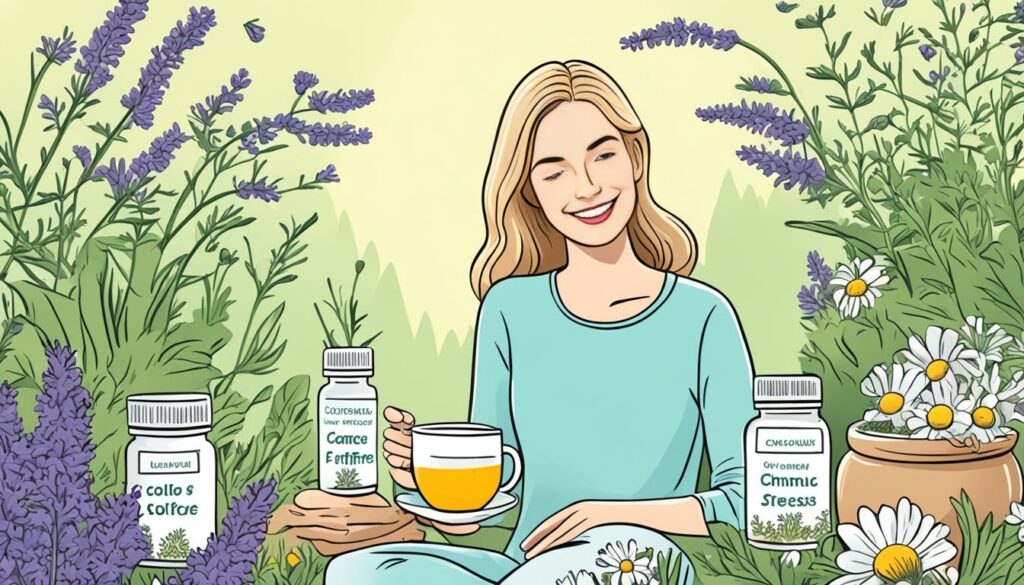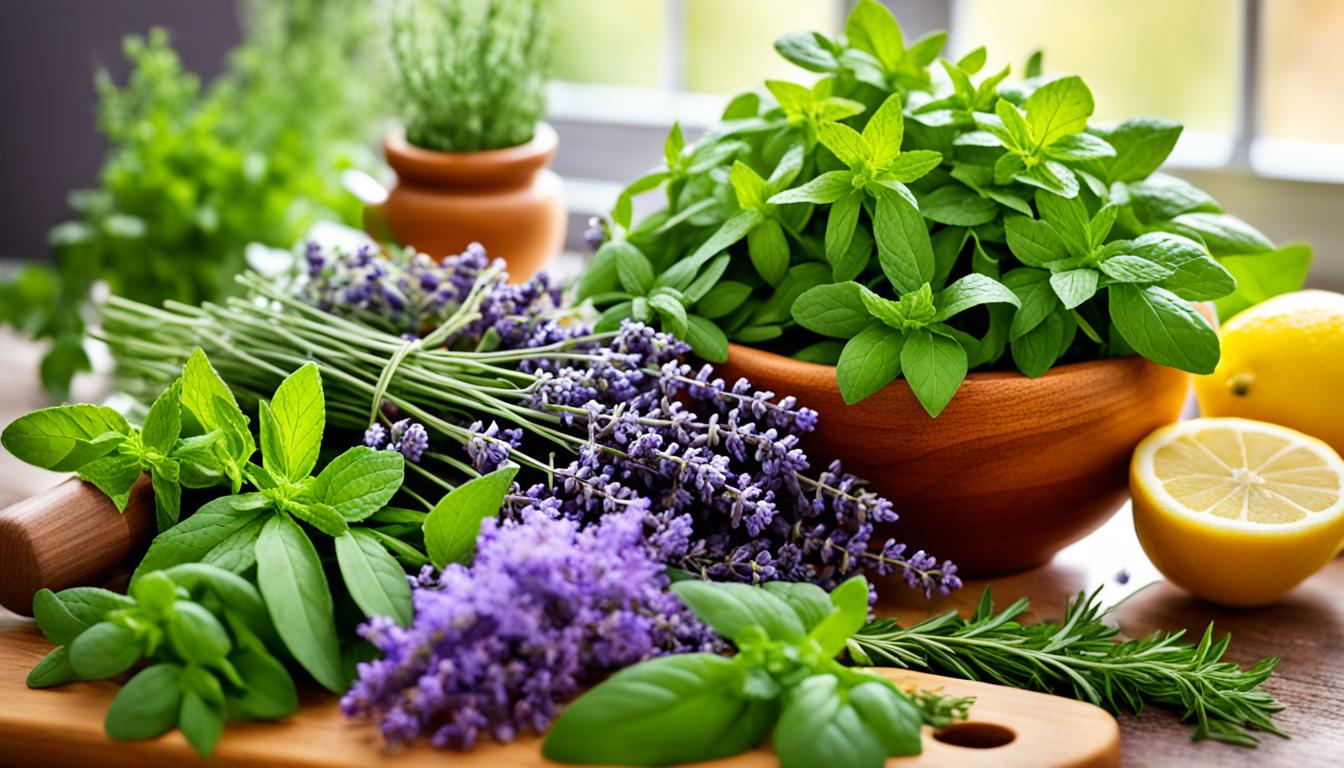Are you tired of the constant struggle with stress and anxiety? Looking for alternative ways to find relief without relying on medication? Discover the power of herbal remedies for stress and embark on a journey to natural stress relief.
Stress has become a prevalent issue in today’s fast-paced world, affecting our mental and physical well-being. While traditional treatments certainly have their place, have you ever considered turning to nature for support? Studies have shown that certain herbal remedies can provide effective relief for stress and anxiety, offering a holistic approach to managing these overwhelming feelings.
In this article, we will explore the most effective herbal supplements for stress relief and uncover strategies for managing stress naturally. From the soothing effects of chamomile to the adaptogenic benefits of ashwagandha, you’ll learn how these natural remedies can help restore balance in your life.
So, are you ready to discover the secrets of herbal remedies for stress relief? Let’s dive in and find the natural relief you’ve been seeking.
Effective Herbal Remedies for Anxiety
When it comes to finding natural remedies for anxiety, several herbal supplements have shown promise in reducing symptoms and promoting overall mental health. These herbal remedies can be a safe and effective alternative to traditional medications, offering stress reduction and emotional support. However, it’s important to consult with a healthcare professional before incorporating any herbal supplements into your routine, as they may interact with medications or have potential side effects.
1. Kava
Kava, a plant native to the South Pacific, has been used for centuries as a natural remedy for anxiety and stress. It contains compounds called kavalactones that have been found to promote relaxation and reduce anxiety symptoms. Kava is often consumed as a tea, tincture, or supplement, but it’s important to note that long-term or excessive use may have adverse effects on the liver. Therefore, it’s crucial to follow recommended dosage guidelines and seek professional advice.
2. Passion Flower
Passion flower is an herb known for its calming properties and ability to reduce anxiety. It works by increasing the levels of gamma-aminobutyric acid (GABA) in the brain, which helps to regulate mood and promote relaxation. Passion flower can be consumed as a tea, supplement, or tincture. While generally safe, it’s advisable to avoid passion flower if you are pregnant or taking sedative medications.
3. Valerian
Valerian root is widely used as a natural remedy for anxiety and sleep disorders. It has been shown to increase levels of GABA in the brain, promoting relaxation and easing anxiety symptoms. Valerian is available in various forms, including capsules, tablets, and teas. While generally safe, it may interact with certain medications, including sedatives, anticonvulsants, and some antidepressants, so it’s essential to consult with your healthcare professional before use.
4. Chamomile
Chamomile is a popular herb known for its calming effects and ability to reduce anxiety. It contains compounds that bind to the same brain receptors as benzodiazepines, a class of medications often prescribed for anxiety disorders. Chamomile can be consumed as a tea or taken as a supplement. However, individuals with allergies to ragweed or daisies should exercise caution, as they may experience adverse reactions.
5. Lavender
Lavender is a fragrant herb that has long been used for its calming and relaxing properties. It can help reduce anxiety symptoms by promoting a sense of tranquility. Lavender can be used in various forms, such as essential oil for aromatherapy, herbal tea, or capsules. It’s generally safe for most individuals, but it’s recommended to avoid lavender oil if you have low blood pressure or are taking certain medications.
6. Lemon Balm
Lemon balm is an herb known for its stress-relieving and mood-enhancing properties. It has been found to reduce anxiety and promote a sense of calm. Lemon balm can be consumed as a tea, tincture, or supplement. While generally safe, it may interact with some thyroid medications or sedative medications, so it’s best to consult with a healthcare professional before use.
7. Smoketree
Smoketree, also known as Cotinus coggygria, is a lesser-known herb that has shown potential in reducing anxiety symptoms. It acts as a natural sedative, promoting relaxation and easing feelings of stress. Smoketree can be consumed as a tea or taken as a supplement. However, it’s important to note that research on smoketree’s effectiveness and safety is limited, so further studies are needed.
Incorporating these herbal remedies into your daily routine may provide support for managing anxiety and promoting calmness. However, it’s crucial to consult with a healthcare professional before starting any herbal supplement to ensure it’s safe for you, particularly if you have any underlying medical conditions or are taking prescription medications.

| Herbal Remedy | Main Benefit | Form | Precautions |
|---|---|---|---|
| Kava | Promotes relaxation | Tea, tincture, supplement | Avoid long-term or excessive use as it may affect the liver |
| Passion Flower | Calming properties, regulates mood | Tea, supplement, tincture | Avoid if pregnant or taking sedative medications |
| Valerian | Increases GABA levels, promotes relaxation | Capsules, tablets, tea | May interact with sedatives and certain antidepressants, consult healthcare professional |
| Chamomile | Calming effects, reduces anxiety | Tea, supplement | Avoid if allergic to ragweed or daisies |
| Lavender | Calms the mind, promotes relaxation | Essential oil, tea, capsules | Avoid if low blood pressure or taking specific medications |
| Lemon Balm | Reduces anxiety, enhances mood | Tea, tincture, supplement | May interact with thyroid or sedative medications, consult healthcare professional |
| Smoketree | Natural sedative, eases stress | Tea, supplement | Research on effectiveness and safety is limited |
Benefits of Ashwagandha for Stress and Anxiety
Ashwagandha, an adaptogenic herb, offers numerous benefits for natural stress relief and mental well-being. This powerful herb has been extensively studied for its ability to regulate the body’s response to stress and promote a sense of calm.
Research has shown that ashwagandha can help lower cortisol levels, the primary stress hormone in the body. By reducing cortisol, ashwagandha can alleviate the negative effects of chronic stress and promote a more balanced mood.
In addition to stress reduction, ashwagandha has been found to improve sleep quality. Lack of sleep is often a common symptom of stress and anxiety, and ashwagandha can help restore healthy sleep patterns, allowing for better rest and rejuvenation.
Ashwagandha also has a positive impact on overall mental health. Studies have shown that it can reduce symptoms of anxiety, depression, and other mood disorders.
This herbal supplement is available in various forms, such as tablets, capsules, and liquid tinctures, making it easy to incorporate into a holistic stress relief regimen.
With its natural stress-relieving properties and overall benefits for mental well-being, ashwagandha is a valuable herbal remedy for those seeking a natural approach to managing stress and anxiety.
The Science Behind Ashwagandha
“Studies have shown that ashwagandha can lower cortisol levels, improve sleep quality, and reduce stress levels.”
| Benefits of Ashwagandha | Details |
|---|---|
| Stress Reduction | Ashwagandha helps lower cortisol levels, reducing the negative effects of chronic stress. |
| Improved Sleep Quality | Ashwagandha promotes better sleep patterns, allowing for more restful nights. |
| Positive Mental Health | Ashwagandha can alleviate symptoms of anxiety, depression, and other mood disorders. |

With its wide range of benefits and minimal side effects, ashwagandha is a safe and effective natural solution for managing stress and anxiety. However, it’s important to consult with a healthcare professional before incorporating any herbal supplements into your routine, especially if you are pregnant, breastfeeding, or have underlying medical conditions.
The Calming Effects of Chamomile
Chamomile, especially Roman chamomile and German chamomile, is well-known for its calming properties, making it one of the most popular natural remedies for stress and anxiety. This herb has been used for centuries to promote relaxation and reduce feelings of tension.
One of the easiest ways to enjoy the calming benefits of chamomile is by drinking chamomile tea. Simply steeping the dried chamomile flowers in hot water can create a soothing and aromatic beverage that can help relieve stress. For added convenience, chamomile tea bags can be readily found in grocery stores and online.
Aside from its tea form, chamomile is also available in other preparations. Some individuals find chamomile tablets or capsules more convenient for daily use. Additionally, chamomile essential oil can be used in aromatherapy to promote relaxation and relieve anxiety. It can be diffused or diluted and applied topically after consulting with a healthcare provider or aromatherapist.

Research has shown that chamomile may be particularly helpful in relieving symptoms of generalized anxiety disorder. A study published in the Journal of Clinical Psychopharmacology found that chamomile extract significantly reduced anxiety symptoms in individuals diagnosed with this disorder. Another study published in the Journal of Psychopharmacology suggested that chamomile may have an effect similar to benzodiazepine medications, which are commonly prescribed for anxiety disorders.
Chamomile’s natural sedative properties may provide a gentle and calming effect on the body and mind, helping to alleviate stress and anxiety.
However, it’s important to note that chamomile may not be suitable for everyone. Individuals with known allergies to plants in the Asteraceae family, such as ragweed or chrysanthemums, may also be allergic to chamomile. Additionally, chamomile may interact with certain medications, including anticoagulants and sedatives. It’s always best to consult with a healthcare provider before incorporating chamomile into your stress management regimen.
Summary:
- Chamomile is a popular herbal remedy for stress and anxiety, known for its calming properties.
- It can be consumed as chamomile tea, taken in tablet form, or used in aromatherapy.
- Research suggests that chamomile may help relieve symptoms of generalized anxiety disorder.
- Individuals with allergies or those taking certain medications should consult with their healthcare provider before using chamomile.
Valerian: A Natural Solution for Sleep and Anxiety
When it comes to finding natural remedies for stress and anxiety, valerian root has been a popular choice for centuries. With its potential benefits for improving sleep and alleviating anxiety, valerian offers a natural solution for those seeking stress reduction remedies and stress management techniques.
Research on the effectiveness of valerian for sleep and anxiety is limited but promising. Some studies have suggested that valerian may help reduce anxiety symptoms and promote better sleep quality. However, it’s important to note that further research is needed to fully understand its long-term effects and safety, particularly for specific populations such as pregnant individuals and children.
Valerian is available in various forms, including capsules, tablets, and herbal teas. It is believed to work by interacting with the brain’s GABA receptors, which can help induce relaxation and reduce feelings of anxiety and stress. As a natural stress relief option, valerian can be a valuable addition to a holistic stress management regimen.

“Valerian has been used for centuries to promote relaxation and support restful sleep. It’s a gentle and natural option for individuals seeking stress relief without the use of medication.”
The Soothing Effects of Lavender
Lavender, in the form of oral lavender or aromatherapy, has shown potential in reducing anxiety. Evidence suggests that it can have a calming effect on the central nervous system, leading to decreased anxiety levels.
One study published in the Journal of Alternative and Complementary Medicine found that aromatherapy using lavender essential oil significantly reduced anxiety levels in patients undergoing coronary artery bypass surgery.
“Aromatherapy using lavender essential oil significantly reduced anxiety levels in patients undergoing coronary artery bypass surgery.”
Another study published in the Journal of Medical Research evaluated the effects of oral lavender capsules on patients with generalized anxiety disorder. The results showed that lavender supplementation significantly reduced anxiety symptoms compared to the placebo group.
It is important to note that while lavender can be beneficial for stress relief, individuals should be cautious of potential side effects. Some people may experience constipation, headaches, or low blood pressure when using lavender products. It is always recommended to consult with a healthcare professional before introducing any herbal remedies, including lavender, into your routine.
How to Use Lavender for Stress Relief
There are various ways to incorporate the soothing effects of lavender into your daily routine:
- Essential Oil: Add a few drops of lavender essential oil to a diffuser or inhale the scent directly from the bottle.
- Aromatherapy: Take a relaxing bath with lavender-scented bath salts or use lavender-scented candles during relaxation exercises.
- Oral Supplements: Follow the recommended dosage guidelines when taking oral lavender capsules or extracts.
- Topical Applications: Apply lavender-infused lotions, creams, or massage oils to your skin.
Remember, finding the right method and dosage that works for you may require some experimentation, and it is always best to consult with a healthcare professional before making any changes to your wellness routine.

| Lavender Products | Method of Use |
|---|---|
| Lavender Essential Oil | Diffuse a few drops in a diffuser or inhale directly from the bottle. |
| Lavender-Scented Bath Salts | Add to a warm bath and soak for relaxation. |
| Lavender-Scented Candles | Light during meditation or relaxation exercises. |
| Lavender Capsules or Extracts | Take orally following the recommended dosage guidelines. |
| Lavender-Infused Lotions, Creams, or Oils | Apply topically to the skin for a calming effect. |
Other Herbal Remedies and Natural Strategies for Stress Relief
In addition to the previously mentioned herbal remedies, there are several other natural strategies for stress relief. Lemon balm, passionflower, kava kava, cannabidiol (CBD) oil, and various herbal teas are all potential options worth exploring.
While herbal supplements and natural remedies can provide natural stress relief, it’s important to note that they are not regulated by the FDA. Therefore, it is crucial to consult with a healthcare professional before using any herbal remedy to ensure compatibility with medications or pre-existing conditions and to minimize potential risks or interactions.
Furthermore, incorporating lifestyle changes can also contribute to overall stress reduction and mental well-being. Engaging in regular exercise, practicing mindfulness through meditation or relaxation exercises, journaling, implementing effective time management strategies, harnessing the power of aromatherapy, and spending quality time with animals are all powerful stress management techniques that can significantly improve mental health.

